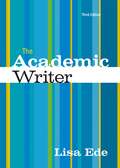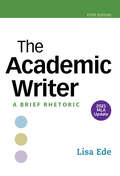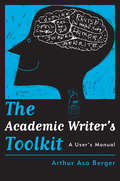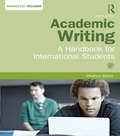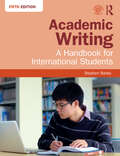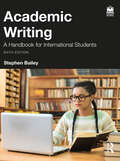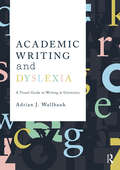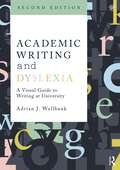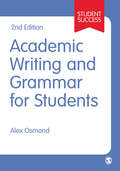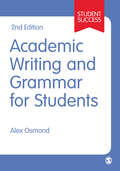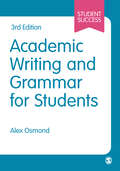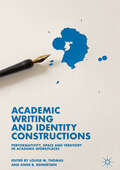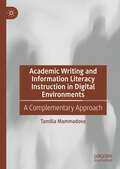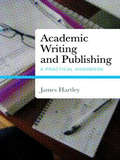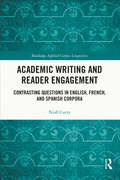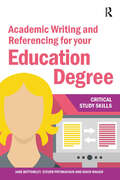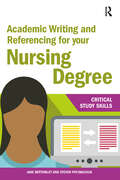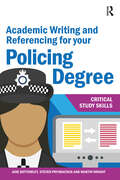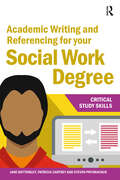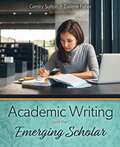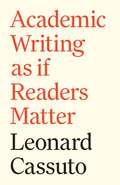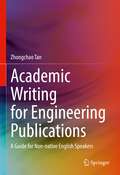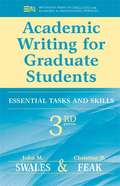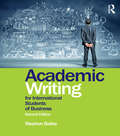- Table View
- List View
The Academic Writer: A Brief Guide (Third Edition)
by Lisa EdeWritten in Lisa Ede's accessible, supportive style, The Academic Writer is an affordable, brief guide to the essentials of academic writing and research. By framing reading and writing situations in terms of the writer, reader, text, and medium, Ede helps students think rhetorically and make effective choices. The text provides abundant coverage of reading, including a new chapter--"Reading on Page and Screen"--that helps students match device to purpose, and a second chapter of strategies for active and critical reading. It emphasizes analysis and synthesis, key skills required to master the moves of academic writing. And it provides advice on writing in the disciplines as well as numerous student models. With its updated coverage of research and its attention to visuals and design, The Academic Writer is the perfect introduction to college writing--at a great price.
The Academic Writer with 2021 MLA Update: A Brief Rhetoric
by Lisa EdeThis ebook has been updated to provide you with the latest guidance on documenting sources in MLA style and follows the guidelines set forth in the MLA Handbook, 9th edition (April 2021).The Academic Writer is a brief, affordable guide that’s the ideal introduction to college writing.
The Academic Writer's Toolkit: A User’s Manual
by Arthur Asa BergerBerger’s slim, user-friendly volume on academic writing is a gift to linguistically-stressed academics. Author of 60 published books, the author speaks to junior scholars and graduate students about the process and products of academic writing. He differentiates between business writing skills for memos, proposals, and reports, and the scholarly writing that occurs in journals and books. He has suggestions for getting the “turgid” out of turgid academic prose and offers suggestions on how to best structure various forms of documents for effective communication. Written in Berger’s friendly, personal style, he shows by example that academics can write good, readable prose in a variety of genres.
Academic Writing: A Handbook for International Students
by Stephen BaileyMost international students need to write essays and reports for exams and coursework, but writing good academic English is one of the most demanding tasks students face. This new, fourth edition of Academic Writing: A Handbook for International Students has been completely revised to help students reach this goal. The four main parts of Academic Writing are: The writing process Elements of writing Vocabulary for writing Writing models Each part is divided into short units which contain examples, explanations and exercises, for use in the classroom or for self-study. The units are clearly organised to allow teachers and students find the help they need with writing tasks, while cross-referencing allows easy access to relevant sections. In the first part, each stage of the writing process is demonstrated and practised, from selecting suitable sources, reading, note-making and planning through to re-writing and proof-reading. The fourth edition of this popular course builds on the success of the earlier editions, and has a special focus on the vital topic of academic vocabulary in part three, Vocabulary for Writing. Part three deals with areas such as nouns and adjectives, adverbs and verbs, synonyms, prefixes and prepositions, in an academic context. More key features of the book include: All elements of writing are clearly explained, with a full glossary for reference Models provided for all types of academic texts: essays, reports, reviews and case-studies Full range of practice exercises, with answer key included Use of authentic academic texts A companion website offers further practice with a range of additional exercises Fully updated, with sections on finding electronic sources and evaluating internet material All international students wanting to maximise their academic potential will find this practical and easy-to-use book an invaluable guide to writing in English for their degree courses.
Academic Writing: A Handbook for International Students
by Stephen BaileyNow in its fifth edition, Academic Writing helps international students succeed in writing essays and reports for their English-language academic courses. Thoroughly revised and updated, it is designed to let teachers and students easily find the topics they need, both in the classroom and for self-study.The book consists of five parts: The Writing Process Elements of Writing Language Issues Vocabulary for Writing Writing Models The first part explains and practises every stage of essay writing, from choosing the best sources, reading and note-making, through to referencing and proofreading. The four remaining parts, organised alphabetically, can be taught in conjunction with the first part or used on a remedial basis. A progress check at the end of each part allows students to assess their learning. All units are fully cross-referenced, and a complete set of answers to the practice exercises is included.New topics in this edition include Writing in Groups, Written British and American English, and Writing Letters and Emails. In addition, the new interactive website has a full set of teaching notes as well as more challenging exercises, revision material and links to other sources. Additional features of the book include: Models provided for writing tasks such as case studies and essays Use of authentic academic texts from a wide range of disciplines Designed for self-study as well as classroom use Useful at both undergraduate and postgraduate level Glossary to explain technical terms, plus index Written to deal with the specific language issues faced by international students, this practical, user-friendly book is an invaluable guide to academic writing in English.
Academic Writing: A Handbook for International Students
by Stephen BaileyThe new sixth edition of this popular book has been written to help international students succeed in writing essays and reports for their English-language academic courses. Thoroughly revised and updated in a streamlined format making it even easier for students and teachers to use, Academic Writing: A Handbook for International Students is designed to let readers find the support they need easily, both in the classroom and for self-study.The book consists of three parts, comprising a total of 28 units: The Writing Process and Writing Skills; Elements of Writing; and Writing Models. The first part explains and practises every stage of essay writing, from choosing the best sources, reading and note-making, through to referencing and proofreading. These stages are supported by relevant explanations of critical writing skills, so that, for instance, finding synonyms is linked with paraphrasing and summarising. The second part explains critical issues such as using numbers and punctuation, and is organised alphabetically, while the third part provides models for common components of student writing such as case studies and reports. All units are fully cross-referenced and can be taught in conjunction with each other or used for self-study or reference. A progress check at the end of each part allows students to self-assess their learning, and a complete set of answers to the practice exercises is included.Additional features of the book include: Use of authentic academic texts from a wide range of disciplines Designed for self-study as well as classroom use Useful at both undergraduate and postgraduate level Fully updated, with sections on using AI and exploring electronic sources Access to the free interactive website which includes a full set of teaching notes as well as more challenging exercises, revision material and links to other sources. All international students wanting to maximise their academic potential will find this practical and easy-to-use book an invaluable guide to writing in English for their degree courses.
Academic Writing and Dyslexia: A Visual Guide to Writing at University
by Adrian J. WallbankThis book presents a unique visual approach to academic writing and composition specifically tailored to the needs of dyslexic students in higher education. Readers will learn to successfully structure and articulate their ideas, get to grips with critical reading, thinking and writing, and fulfil their full academic potential. The ‘writing process’ is demystified and techniques for writing compelling, insightful and mark generating essays are conveyed via innovative and meaningful representations, templates, images, icons and prompts, specifically designed to meet the visual and ‘big picture’ strengths of dyslexic learners. A companion website offers supplementary exercises, examples, videos and a full range of downloadable templates and bookmarks. Written by a dyslexic for dyslexics, Academic Writing and Dyslexia is underpinned by extensive research. As a dyslexic student you will learn to present your thoughts with confidence, critically evaluate competing arguments and gain top marks. The book will help you bridge the gap between your existing coping strategies and the increased demands and rigours of academic writing at university. It will be an invaluable resource for dyslexic students, academics, dyslexia specialists, learning developers and writing tutors throughout the higher education sector.
Academic Writing and Dyslexia: A Visual Guide to Writing at University
by Adrian J. WallbankFully revised and expanded, this book presents a unique visual approach to academic writing and composition tailored to the needs of students with dyslexia in Higher Education. It will help you to successfully structure and articulate your ideas, get to grips with critical reading, thinking and writing and fulfil your full academic potential. The ‘writing process’ (e.g. genre and style, critical thinking and reading, writing, sentence construction, and proofreading editing) is de-mystified and translated into innovative, meaningful visual representations in the form of templates, images, icons and prompts designed to meet the visual and ‘big picture’ learning styles and strengths of your dyslexia. Underpinned by extensive research, this book will help you to present your thoughts and evaluate and critique competing arguments in a compelling way. It is written to help you bridge the gap between your existing coping strategies and the increased demands and rigours of academic writing at university. This second edition features enhanced visual techniques for reading online, expanded material to cover scientific writing, literature reviews, reflective writing and academic style, and detailed explanations of how dyslexia affects writing, how to reduce pressure on your working memory and how to get your creativity and ideas onto the page in order to excel. This book serves as an invaluable resource for dyslexic students, academics, dyslexia specialists, learning developers, and writing tutors throughout the Higher Education sector.
Academic Writing and Grammar for Students (SAGE Study Skills Series)
by Alex OsmondAvailable as an E-Inspection Copy! Go here to order Grappling with grammar? Struggling with punctuation? Whether you're writing an essay or assignment, report or dissertation, this useful guide shows you how to improve the quality of your work at university – fast – by identifying and using the correct use of English grammar and punctuation in your academic writing. Using tried and tested advice from student workshops, Alex Osmond shares practical examples that illustrate common mistakes, and shows you how to avoid them. You’ll also discover guidance on: Writing structure – the what and how of crafting sentences and paragraphs Conciseness – how to express your point succinctly and clearly, showing you understand the topic Effective proofreading – the importance of the final ‘tidy up’, so your work is ready to hand in Referencing – common systems, and how to reference consistently (and avoid plagiarism). This new edition also includes separate chapters on critical thinking and referencing, exploring each topic in more detail, and learning outcomes in every chapter, so you can identify what new skills you’ll take away. Personal tips and advice direct from Alex Osmond For access to additional resources and one-to-one advice from Alex, 'like' his Facebook page Academic Writing and Grammar for Students. SAGE Study Skills are essential study guides for students of all levels. From how to write great essays and succeeding at university, to writing your undergraduate dissertation and doing postgraduate research, SAGE Study Skills help you get the best from your time at university. Visit the SAGE Study Skills hub for tips, resources and videos on study success!
Academic Writing and Grammar for Students (SAGE Study Skills Series)
by Alex OsmondThis handy guide shows students how to use academic English grammar and punctuation. The author identifies common grammar mistakes and how to avoid them, making extensive use of examples and advice from tutors from a range of subjects. This valuable book enables readers to immediately improve their work at university.<P> Inside, you will find practical advice on:<P> * common mistakes<P> * punctuation<P> * conciseness<P> * proofreading<P> * referencing<P> * and more.<P> The advice in the book has been tried and tested through workshops that the author runs with students. It will be useful to undergraduates on a wide range of courses, and will help promote independent learning as well as practical writing skills.
Academic Writing and Grammar for Students (Student Success)
by Alex OsmondFrom grammar and punctuation, to proofreading and fixing mistakes, this is your one-stop guide to improving your academic writing to achieve better grades at university. Including quotes from tutors and examples of good and bad practice, this book provides step-by-step guidance on Basic conventions of academic writing Critical thinking Conciseness and clarity Proofreading and referencing Common mistakes and how to avoid them. Student Success is a series of essential guides for students of all levels. From how to think critically and write great essays to boosting your employability and managing your wellbeing, the Student Success series helps you study smarter and get the best from your time at university.
Academic Writing and Grammar for Students (Student Success)
by Alex OsmondFrom grammar and punctuation, to proofreading and fixing mistakes, this is your one-stop guide to improving your academic writing to achieve better grades at university. Including quotes from tutors and examples of good and bad practice, this book provides step-by-step guidance on Basic conventions of academic writing Critical thinking Conciseness and clarity Proofreading and referencing Common mistakes and how to avoid them. Student Success is a series of essential guides for students of all levels. From how to think critically and write great essays to boosting your employability and managing your wellbeing, the Student Success series helps you study smarter and get the best from your time at university.
Academic Writing and Identity Constructions: Performativity, Space And Territory In Academic Workplaces
by Louise M. Thomas Anne B. ReinertsenThis book presents multiple cultural and contextual takes on working performances of academic/writer/thinker, both inside and outside the academy. With worldwide, seismic shifts taking place in both the contexts and terrains of universities, and subsequently the altering of what it means to write as an academic and work in academia, the editors and contributors use writing to position and re-position themselves as academics, thinkers and researchers. Using as a point of departure universities and academic/writing work contexts shaped by the increasing dominance of commodification, measurement and performativity, this volume explores responses to these evolving, shifting contexts. In response to the growing global interest in writing as performance, this book breaks new ground by theorizing multiple identity constructions of academic/writer/researcher; considering the possibilities and challenges of engaging in academic writing work in ways that are authentic and sustainable. This reflective and interdisciplinary volume will resonate with students and scholars of academic writing, as well as all those working to reconcile different facets of identity.
Academic Writing and Information Literacy Instruction in Digital Environments: A Complementary Approach
by Tamilla MammadovaThis book offers an interdisciplinary approach to the teaching of academic writing and information literacy in a new digital dimension, drawing on recent trends towards project-based writing, digital writing and multimodal writing in Education, and synthesising theory with practice to provide a handy toolkit for teachers and researchers. The author combines a practical orientation to teaching academic writing and information literacy with a grounding in current theories of writing instruction in the digitalized era, and argue that as digital environments become more universal in modern society - particularly in the aftermath of the coronavirus pandemic - the lines between traditional academic writing and multi-modal digital writing must necessary become blurred. This book will be of use to teachers and instructors of academic writing and information literacy, particularly within the context of English for Academic Purposes (EAP), as well as students and researchers in Applied Linguistics, Pedagogy and Digital Writing.
Academic Writing and Publishing: A Practical Handbook
by James HartleyAcademic Writing and Publishing will show academics (mainly in the social sciences) how to write and publish research articles. Its aim is to supply examples and brief discussions of recent work in all aspects of the area in short, sharp chapters. It should serve as a handbook for postgraduates and lecturers new to publishing. The book is written in a readable and lively personal style. The advice given is direct and based on up-to-date research that goes beyond that given in current textbooks. For example, the chapter on titles lists different kinds of titles and their purposes not discussed in other texts. The chapter on abstracts instructs the reader on writing structured abstracts from the start.
Academic Writing and Reader Engagement: Contrasting Questions in English, French and Spanish Corpora (Routledge Applied Corpus Linguistics)
by Niall CurryAcademic Writing and Reader Engagement offers a concise linguistic description of the use and functions of questions in English, French and Spanish and discusses their value to the teaching of academic writing. This book: Enables a better understanding of how writers engage readers in academic writing in English, French, and Spanish and where each language behaves similarly or differently; Explains how authors express opinions, organise discourse and create relationships with readers via questions in their academic writing and the various functions questions perform; Brings together research on corpus and contrastive linguistics, highlighting how these two fields can support one another; Offers a thorough investigation of reader engagement markers from a range of linguistic perspectives and considers how knowledge of these markers could be applied to the teaching and learning of academic writing in each language; Employs corpus data totalling approximately 1.2 million words from all three languages to illustrate the varying roles and representations of questions in each language. Providing an invaluable resource for scholars learning to communicate successfully within their academic community, as well as teachers of English, French and/or Spanish for academic purposes, this book is key reading for students and researchers of academic discourse, contrastive linguistics and corpus linguistics.
Academic Writing and Referencing for your Education Degree (Critical Study Skills)
by Jane Bottomley Steven Pryjmachuk David WaughIf you are embarking on a university-based education degree, including initial teacher training, the books in this series will help you acquire and develop the knowledge, skills and strategies you need to achieve your goals. They provide support in all areas important for university study, including institutional and disciplinary policy and practice, self-management, and research and communication. Tasks and activities are designed to foster aspects of learning which are valued in higher education, including learner autonomy and critical thinking, and to guide you towards reflective practice in your study and work life.Academic Writing and Referencing for your Education Degree provides you with a sound knowledge and understanding of: what constitutes good academic writing in education a range of strategies for writing successful essays and reports the importance of clarity and coherence in your writing about education how to improve your academic style, grammar and punctuation, and formatting and presentation referencing conventions in the field of education, and of how to avoid plagiarism.
Academic Writing and Referencing for your Nursing Degree (Critical Study Skills)
by Jane Bottomley Steven PryjmachukInvaluable jargon-free guide for anyone doing a nursing degree, providing study support and helping you to improve your academic writing and referencing skills.Academic Writing and Referencing for your Nursing Degree provides you with a sound knowledge and understanding of: what constitutes good academic writing in nursing a range of strategies for writing successful essays and reports the importance of clarity and coherence in your writing about nursing how to improve your academic style, grammar and punctuation, and formatting and presentation referencing conventions in the field of nursing, and of how to avoid plagiarism. If you are embarking on a university nursing degree, the books in our Critical Study Skills for Nursing series will help you acquire and develop the knowledge, skills and strategies you need to achieve your goals. They provide support in all areas important for university study, including institutional and disciplinary policy and practice, self-management, and research and communication. Tasks and activities are designed to foster aspects of learning which are valued in higher education, including learner autonomy and critical thinking, and to guide you towards reflective practice in your study and work life.
Academic Writing and Referencing for your Policing Degree (Critical Study Skills)
by Jane Bottomley Steven Pryjmachuk Martin WrightIf you are embarking on a university criminology, policing or other law enforcement professional degree, the books in this series will help you acquire and develop the knowledge, skills and strategies you need to achieve your goals. They provide support in all areas important for university study, including institutional and disciplinary policy and practice, self-management, and research and communication. Tasks and activities are designed to foster aspects of learning which are valued in higher education, including learner autonomy and critical thinking, and to guide you towards reflective practice in your study and work life.Academic Writing and Referencing for your Policing Degree provides you with a sound knowledge and understanding of: what constitutes good academic writing in policing a range of strategies for writing successful essays and reports the importance of clarity and coherence in your writing about policing how to improve your academic style, grammar and punctuation, and formatting and presentation referencing conventions in the field of policing, and of how to avoid plagiarism.
Academic Writing and Referencing for your Social Work Degree (Critical Study Skills)
by Jane Bottomley Steven Pryjmachuk Patricia CartneyIf you are embarking on a university social work degree the books in this series will help you acquire and develop the knowledge, skills and strategies you need to achieve your goals. They provide support in all areas important for university study, including institutional and disciplinary policy and practice, self-management, and research and communication. Tasks and activities are designed to foster aspects of learning which are valued in higher education, including learner autonomy and critical thinking, and to guide you towards reflective practice in your study and work life.Academic Writing and Referencing for your Social Work Degree provides you with a sound knowledge and understanding of: what constitutes good academic writing in social work a range of strategies for writing successful essays and reports the importance of clarity and coherence in your writing about education how to improve your academic style, grammar and punctuation, and formatting and presentation referencing conventions in the field of social work, and of how to avoid plagiarism.
Academic Writing and the Emerging Scholar
by Gentry Sutton Dalene FisherAcademic Writing and the Emerging Scholar is an accessible, straightforward text that introduces first-year college students to the fundamentals of beginning composition. All four of its main sections are highly practical, and the authors have designed a number of learning activities that can serve as homework assignments, in-class exercises, or classroom-discussion facilitators. The book’s section on the basics of composition contains annotated example essays, and its MLA section conveniently combines in-text citation examples and corresponding bibliographic examples. Academic Writing and the Emerging Scholar is a concise text that does not distract first-year students with a lot of “extra” information. Rather, its focus is on fundamental concepts and mechanics that are requisite to higher-level writing courses.
Academic Writing as if Readers Matter (Skills for Scholars #4)
by Leonard CassutoA guide to writing with the reader in mindIf you want people to read your writing, it has to be readable. In Academic Writing as if Readers Matter, Leonard Cassuto offers academic writers a direct, practical prescription for writing that will be read and understood: Take care of your reader. With a wealth of examples from the arts and sciences, this short, witty book provides invaluable advice to writers at all levels, in all fields, on how to write better for both specialized and broad audiences.Good academic writing depends on connecting with readers, earning their time and attention. Cassuto offers tips and advice on how to sharpen arguments and make complex ideas compelling. He addresses the workings of introductions and conclusions, transitions, signposts, paragraphs, and sentences—all the building blocks of academic writing. He also shows how storytelling and metaphor can make your prose more engaging than you thought possible. And he explains the proper use of that most dangerous of tools: jargon.This book can make any academic writer—including you—into a better writer. That means becoming a better communicator of the ideas and discoveries you want the world to grasp. For the sake of readers inside the academy and beyond it, Academic Writing as if Readers Matter shows how and why you have to make your writing connect with the people you&’re writing for.
Academic Writing for Engineering Publications: A Guide for Non-native English Speakers
by Zhongchao TanThis textbook is designed for non-native English speakers who need to write scientific and engineering research articles, technical reports, engineering thesis, academic books, and other technical documents in English. The author focuses on formal academic writing in a professional language and frame. The book is written in standard English and provides useful guidelines on development of thoughts, organization of ideas, construction of paragraphs and sentences, and choices of precise words. It also pays attention to details such as visual creation, punctuation, and format. Informal writing is excluded from the scope of this practical guideline.
Academic Writing For Graduate Students: Essential Tasks And Skills
by John M. Swales Christine FeakLike its predecessor, the third edition of Academic Writing for Graduate Students explains understanding the intended audience, the purpose of the paper, and academic genres; includes the use of task-based methodology, analytic group discussion, and genre consciousness-raising; shows how to write summaries and critiques; features Language Focus sections that address linguistic elements as they affect the wider rhetorical objectives; and helps students position themselves as junior scholars in their academic communities. Among the many changes in the third edition: *newer, longer, and more authentic texts and examples *greater discipline variety in texts (added texts from hard sciences and engineering) *more in-depth treatment of research articles *greater emphasis on vocabulary issues *revised flow-of-ideas section *additional tasks that require students to do their own research *more corpus-informed content *binding that allows the book to lay flat when open. The Commentary (teacher's notes and key) (978-0-472-03506-9) has been revised expanded.
Academic Writing for International Students of Business
by Stephen BaileyInternational students of Business or Economics often need to write essays and reports for exams and coursework, and this new, second edition of Academic Writing for International Students of Business has been completely revised and updated to help them succeed with these tasks. This book explains the academic writing process from start to finish, and practises all the key writing skills in the context of Business Studies. The book can be used either with a teacher or for self-study, and is clearly organised into four parts, with each divided into short units that contain examples, explanations and exercises for use in the classroom or for self-study: The Writing Process, from assessing sources to proofreading Elements of Writing, practising skills such as making comparisons Vocabulary for Writing, dealing with areas such as nouns and adjectives, adverbs and verbs, synonyms, prefixes and prepositions, in an academic context Writing Models, illustrating case studies, reports, longer essays and other key genres This is an up-to-date book that reflects the interests and issues of contemporary Business Studies, with revised exercises, updated reading texts and a new glossary to ensure accessibility and maximise usability. Students wanting to expand their academic potential will find this practical and easy-to-use book an invaluable guide to writing in English for their degree courses, and it will also help students planning a career with international companies or organisations, where proficiency in written English is a key skill. All aspects of writing clearly explained, with full glossary for reference Full range of practice exercises, with answer key included Use of authentic academic texts Fully updated, with sections on finding electronic sources and evaluating internet material
